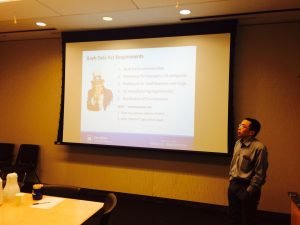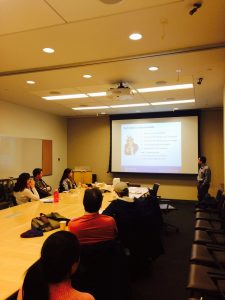It was our great pleasure to have Dr. Jianbo Hu give a seminar on “Careers in Technology Transfer”. Dr. Hu described his career path towards a technology licensing officer, and provided several tips and training resources for graduate students interested in tech transfer.
As a senior technology licensing officer at Penn State College of Medicine and Hershey Medical Center, Dr. Hu independently manages all aspects of the College’s technology transfer needs, for instance negotiating NDA, MTA, collaboration agreements, and IP and data access for sponsored research agreements with many pharmaceutical companies. He also contributes to the College’s research contracts and clinical trial agreements negotiation with both for-profit and non-profit organizations.
Dr. Hu received his Ph.D. from the Department of Animal Sciences at Washington State University in 2000, he continued as a postdoctoral fellow and then a research scientist. He started as a Technology Transfer Specialist at the National Cancer Institute in 2007. Before moving to Penn State in September 2017, Dr. Hu worked at Oregon State University as a Licensing and Patenting Manager. He has significant experience in handling technologies in the areas of biomedical and life sciences, chemistry, chemical engineering and microfluidics.
During his talk, Dr. Hu started by introducing the Bayh-Dole Act in 1980, how it dealt with intellectual property arising from federal government-funded research, and further motivated the universities to establish technology transfer offices. He also gave a thorough explanation of technology transfer as an industry, an overview of the job market, and a typical day-to-day life as a technology licensing officer.
Next, Dr. Hu talked about how his research experiences in National Cancer Institutes led him towards the fellowship position as a Technology Transfer Specialist, where he started a career in tech transfer. He then pointed out that the transitioning process was rewarding but also challenging, and then introduced the resources and professional organizations he found helpful along the way. Finally, Dr. Hu provided advice and tips for graduate students interested in a tech transfer career, and how they could get prepared during graduate school, such as collaborating on industry projects, working in the area of medical applications/drug discovery, and engaging in multidisciplinary research.
If you are interested in a career in tech transfer and would like to get more specific suggestions, feel free to reach out to Dr. Hu (jxh1078@psu.edu) and also see the below resources and tech transfer organizations.
NIH Foundation for Advanced Education in the Sciences (FAES)
Food and Drug Administration (FDA)
Federal Laboratory Consortium (FLC)
National Council of Entrepreneurial Tech Transfer (NCET2)
NCI Technology Transfer Center Fellowship
Relevant organizations:
Association of University Technology Managers (www.autm.net)
Licensing Executives Society (www.usa-canada.les.org)
US Patent and Trademark Office (www.uspto.gov)
Biotechnology Industry Organization (www.bio.org)


